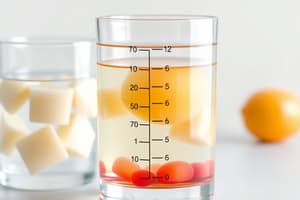Podcast
Questions and Answers
What is the fluid inside the cell called?
What is the fluid inside the cell called?
intracellular fluid
What does extracellular fluid include?
What does extracellular fluid include?
plasma and interstitial fluid
What is the fluid that surrounds the cells called?
What is the fluid that surrounds the cells called?
interstitial fluid
What is the chief mechanism for maintaining fluid balance?
What is the chief mechanism for maintaining fluid balance?
Which organ has the greatest effect on fluid output?
Which organ has the greatest effect on fluid output?
What hormone reduces the amount of water in the body?
What hormone reduces the amount of water in the body?
What hormones increase the amount of water in the body?
What hormones increase the amount of water in the body?
What happens when dehydration begins to occur?
What happens when dehydration begins to occur?
What is the most abundant positive ion in blood plasma?
What is the most abundant positive ion in blood plasma?
What is the most abundant negative ion in blood plasma?
What is the most abundant negative ion in blood plasma?
Which electrolyte is important in hemoglobin production?
Which electrolyte is important in hemoglobin production?
Dehydration can be caused by?
Dehydration can be caused by?
Who has the greatest percentage of body water?
Who has the greatest percentage of body water?
Under normal circumstances, which organ provides the second greatest means of water loss?
Under normal circumstances, which organ provides the second greatest means of water loss?
What percentage of body water can a newborn have?
What percentage of body water can a newborn have?
What term describes a blood sodium level of more than 145 mEq/L?
What term describes a blood sodium level of more than 145 mEq/L?
Obese people tend to have more water per pound of body weight than do slender people.
Obese people tend to have more water per pound of body weight than do slender people.
Adults have less water per pound of body weight than do infants.
Adults have less water per pound of body weight than do infants.
Men tend to have less water per pound of body weight than do women.
Men tend to have less water per pound of body weight than do women.
The most important mechanism in regulating fluid balance is to adjust fluid intake.
The most important mechanism in regulating fluid balance is to adjust fluid intake.
Fluid loss can occur from the kidneys, lungs, skin, or intestines.
Fluid loss can occur from the kidneys, lungs, skin, or intestines.
The body regulates the amount of fluid lost by increasing or decreasing the amount of urine produced.
The body regulates the amount of fluid lost by increasing or decreasing the amount of urine produced.
Water intoxication may result from rapidly drinking large volumes of water or giving hypotonic solutions to persons unable to dilute and excrete urine normally.
Water intoxication may result from rapidly drinking large volumes of water or giving hypotonic solutions to persons unable to dilute and excrete urine normally.
One reason the amount of water per pound increases in the elderly is that the muscle mass decreases and body fat increases.
One reason the amount of water per pound increases in the elderly is that the muscle mass decreases and body fat increases.
One of the first signs of dehydration is the reduction in the production of saliva.
One of the first signs of dehydration is the reduction in the production of saliva.
Match the following terms with their correct definitions:
Match the following terms with their correct definitions:
Flashcards
Intracellular Fluid
Intracellular Fluid
Fluid inside cells, crucial for cell functions.
Extracellular Fluid
Extracellular Fluid
Fluid outside cells, including plasma and interstitial fluid.
Interstitial Fluid
Interstitial Fluid
Fluid surrounding cells; assists nutrient/waste transfer.
Fluid Balance
Fluid Balance
Signup and view all the flashcards
Kidneys Role
Kidneys Role
Signup and view all the flashcards
ANH Hormone
ANH Hormone
Signup and view all the flashcards
ADH & Aldosterone
ADH & Aldosterone
Signup and view all the flashcards
Dehydration (Early Sign)
Dehydration (Early Sign)
Signup and view all the flashcards
Dehydration Causes
Dehydration Causes
Signup and view all the flashcards
Newborn Body Water
Newborn Body Water
Signup and view all the flashcards
Infant vs Adult Water
Infant vs Adult Water
Signup and view all the flashcards
Most Abundant + Ion
Most Abundant + Ion
Signup and view all the flashcards
Predominant - Ion
Predominant - Ion
Signup and view all the flashcards
Iron's Role
Iron's Role
Signup and view all the flashcards
Fluid Loss Routes
Fluid Loss Routes
Signup and view all the flashcards
Urine Regulation
Urine Regulation
Signup and view all the flashcards
Water Intoxication Risk
Water Intoxication Risk
Signup and view all the flashcards
Elderly Water Issues
Elderly Water Issues
Signup and view all the flashcards
Obesity & Water
Obesity & Water
Signup and view all the flashcards
Adults vs Infants Water
Adults vs Infants Water
Signup and view all the flashcards
Women vs Men Water
Women vs Men Water
Signup and view all the flashcards
Fluid Balance Focus
Fluid Balance Focus
Signup and view all the flashcards
Hyponatremia
Hyponatremia
Signup and view all the flashcards
Hypokalemia
Hypokalemia
Signup and view all the flashcards
Hypercalcemia
Hypercalcemia
Signup and view all the flashcards
Hyperkalemia
Hyperkalemia
Signup and view all the flashcards
Study Notes
Fluid and Electrolyte Overview
- Intracellular fluid refers to the fluid within cells, essential for cellular function.
- Extracellular fluid is categorized into plasma and interstitial fluid, accounting for body fluid outside cells.
- Interstitial fluid specifically surrounds cells, facilitating nutrient and waste exchange.
Fluid Balance Mechanisms
- The primary mechanism for maintaining fluid balance involves adjusting fluid output to match fluid input.
- Kidneys have the greatest impact on fluid output, regulating water loss through urine.
- Hormones such as ANH reduce body water while ADH and aldosterone increase water retention.
Dehydration Indicators
- Initial signs of dehydration include decreased salivary secretions.
- Common causes of dehydration are prolonged vomiting, diarrhea, and insufficient fluid intake.
Body Water Composition
- Newborns possess approximately 80% body water, the highest percentage among all age groups.
- Body water percentage is higher in infants compared to adults due to differences in body composition.
Electrolyte Concentrations
- The most abundant positive ion in blood plasma is Sodium, crucial for fluid balance and nerve function.
- Chloride is the predominant negative ion in plasma, playing a role in acid-base balance and digestion.
- Iron is vital for hemoglobin production, essential for oxygen transport in the blood.
Fluid Loss and Regulation
- Significant fluid loss occurs through kidneys, skin, lungs, and intestines; fluid regulation is vital for homeostasis.
- The body alters urine production to maintain fluid levels, influenced by hydration status.
Water Intoxication Risks
- Rapid consumption of water can lead to water intoxication, particularly in individuals unable to excrete excess fluids effectively.
Age-Related Water Composition
- Elderly individuals often show increased body fat and lower muscle mass, which impacts body water composition.
- Contrary to common belief, obese individuals do not have a higher water content per pound of body weight than slender individuals.
True/False Statements
- Adults have less water per pound than infants; women typically have less water than men; fluid balance primarily adjusts fluid output rather than intake.
- Fluid loss and water intoxication are factual concepts that impact overall health, particularly in vulnerable populations.
Matching Terms (Bonus Points)
- Familiarize with terms such as hyperkalemia (high potassium), hyponatremia (low sodium), hypocalcemia (low calcium), hypernatremia (high sodium), hypercalcemia (high calcium), hypokalemia (low potassium) for understanding electrolyte imbalances.
Studying That Suits You
Use AI to generate personalized quizzes and flashcards to suit your learning preferences.




